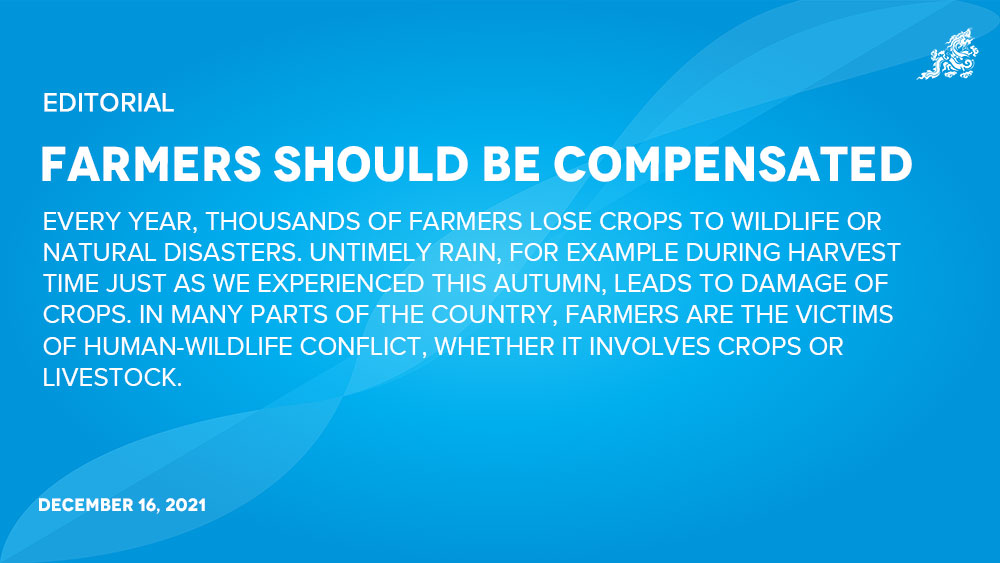Every year, thousands of farmers lose crops to wildlife or natural disasters. Untimely rain, for example during harvest time just as we experienced this autumn, leads to damage of crops. In many parts of the country, farmers are the victims of human-wildlife conflict, whether it involves crops or livestock.
The consequences are clear cut. When farmers lose the yields of year-round hard work to natural disasters or wildlife, they are discouraged from continuing farming. Many look for alternatives, from working at construction sites or locking their doors and migrating to urban areas.
The Covid-19 pandemic has made farmers realise that there are opportunities in farming, not only for growing their own food but for additional sources of income. In rural Bhutan, when we say additional income, we are not only talking about some extra cash to buy essentials that are not grown in the fields. It is about funding education, investing in farm machinery, or savings for a rainy day.
When farmers lose their crops to external factors, they will look to the government for help. Help, for them, usually means “compensation” for crop losses, even if it is not the government’s fault. Some farmers are victims of government policy. A good example is the strict rules governing conservation. We have sound conversation policies, which farmers claim are one-sided. In the human-wildlife conflict, farmers are on the losing end.
The government expressing its inability to provide financial support to the national crop and livestock insurance scheme comes as a surprise. Farmers should be compensated. Farmers are not aware of insuring crops with insurance companies nor are they encouraged to be aware. It has never been a part of the farming tradition. They rely on the government when natural disasters damage or wipe out entire crops. When not affected, they even decline kidus.
With increasing damages from natural disasters and wildlife, there should be a two-way approach to compensating farmers. Encouraging farmers to insure their crops is one, even if it is not profitable for the insurance companies. Compensating farmers from ear-marked government funds is another.
If Bhutan is to achieve the dream of enhancing food self-sufficiency and security, we need people to stay and work on farms. The Covid-19 pandemic has shown us the importance of growing our own food. There are many who feel returning to the villages and engaging in agriculture is a secure way of etching out a livelihood, if not contributing to the national goal of food self-sufficiency.
It is estimated that 50 percent of the country’s population will reside in urban areas by 2037. That is in the next 15 years. This will exert immense pressure on the limited urban infrastructure, demand for jobs, and growing social burden. Bhutan is still an agrarian society with agriculture employing the most people. Investment in agriculture, including compensation for crop loss, will help farmers stay on their farms. After decades of planned developments, most rural areas are now connected with basic infrastructures like roads, telecommunications, and even markets. Prospects for agriculture are increasing. The poultry business is a good example. We are not only egg self-sufficient but have access to quality eggs and poultry products.
Human-wildlife conflict and crop loss to disasters have been highlighted for decades. That the Ministry of Agriculture and Forests is still discussing with the Royal Insurance Corporation of Bhutan to execute a crop insurance scheme is evidence of the importance we attach to agriculture. It is only lip service farmers are getting when they meet their elected leaders or government officials they see on occasional visits.
Agriculture is important, it will remain an important sector, and we need to look into the needs of the farmers with urgency.


